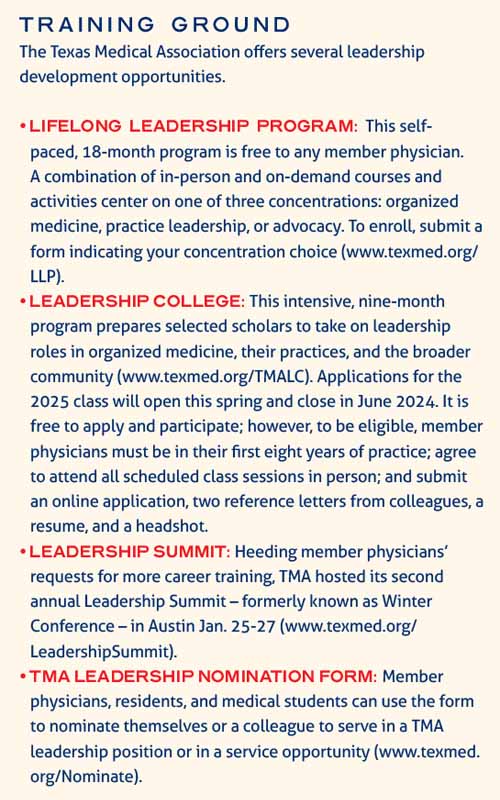
That Samuel Mathis, MD, has only been in practice for six years belies his extensive leadership experience.
Dr. Mathis is an assistant professor of family medicine at the UTMB John Sealy School of Medicine, where he serves as associate director of the Medical Student Education Program and as director of the Integrative and Behavioral Medicine Fellowship. He also represents the Texas Medical Association’s Young Physician Section as a member of TMA’s Board of Trustees and is chair-elect of the American Medical Association’s Young Physician Section. He previously served as president of the Galveston County Medical Society and chaired TMA’s Young Physician Section.
Dr. Mathis credits his resume to TMA’s Leadership College, from which he graduated in 2020. The intensive, nine-month program is open to early-career member physicians and prepares them to assume leadership roles within the association and beyond. (See “Training Ground,” page 32.)
He’s also interested in pursuing additional training. For this reason and others, he and his fellow board members recently approved TMA’s new Lifelong Leadership Program, which debuted at the association’s Leadership Summit in Austin Jan. 25-27.
“It is absolutely imperative that we provide leadership training to anyone who is interested because TMA is made better and stronger when our membership is actively engaged and involved across the generations,” he told Texas Medicine.
The Lifelong Leadership Program is a self-paced, 18-month program free to any TMA member physician. Enrollees participate in a combination of in-person and on-demand courses and activities centered on one of three concentrations: organized medicine, practice leadership, or advocacy.
Along with the Leadership College and the Leadership Summit, this program responds to members’ requests for more career development opportunities and similarly prepares graduates to lead in their practices, organized medicine, and communities.
It also builds on a successful foundation: Beaumont anesthesiologist Ray Callas, MD, will be the first Leadership College alumnus installed as TMA president at TexMed in Dallas May 2-4. (See “Straight Shooter,” page 20.) He stands alongside other graduates who have gone on to hold a diverse array of leadership roles in and outside of TMA, including elected office.
Dr. Callas encourages other physicians to seek out leadership opportunities and to diversify their contributions, whether stepping up at work, inside TMA or specialty societies, or in politics. Doing so, he says, ensures physicians and their patients have an advocate at every level.
“If you’re not a voice for your patients, nobody else will be.”
The Lifelong Leadership Program complements TMA’s leadership development lineup by serving several demographics, says Shanna Combs, MD, an obstetrician-gynecologist in Fort Worth and chair of TMA’s Council on Member Experience. That includes physicians who are new to Texas or to organized medicine, those who were busy building their practices or families during their early careers and now have time for such training, and Leadership College alumni interested in more programming.
Dr. Combs counts herself in this last camp. She’s an alumna of the Class of 2018 and would like to further develop her skills. She adds that the Lifelong Leadership Program will extend Leadership College’s benefits – including networking and community building – across generations.
“It was a great opportunity to engage and work through leadership opportunities but also to engage with different professions from all across Texas,” she said of the college.
The Lifelong Leadership Program also is more accessible, given its rolling enrollment, long duration, flexible pacing, and unlimited eligibility among TMA member physicians. Melanie Fossett, who manages TMA’s leadership programs, says this is by design – and the result of more than five years of development.
TMA’s Committee on Membership, which later merged with the Council on Practice Management Services to form the Council on Member Experience, first reviewed the Lifelong Leadership Program proposal in 2019. More recently, the Council on Member Experience approved the program’s implementation at TMA’s Business of Medicine Conference in September 2023, teeing it up for board consideration.
Although the program has only just begun, Dr. Mathis is confident it will find a large audience.
“Physicians are lifelong learners,” he said. “Such a huge part of who we are is to focus on learning and developing ourselves, keeping up with the latest medical information. So, the Lifelong Leadership Program taps into that natural inclination.”

The Lifelong Leadership Program also taps into TMA’s established leadership development programming with a proven track record of seeding physician leaders in and out of medicine.
Early this year, Leadership Summit offered targeted leadership programming, including CME, across three areas: the personal, professional, and community realms.
Gowrishankar Gnanasekaran, MD, an internist in Pflugerville, recently relocated from Cleveland, Ohio, to build a new geriatrics program. He attended the summit to meet his fellow physicians, get involved in the association, and improve his skills.
“I want to find ways to become a better leader,” he said. “I want to make sure what I’m taking back from this program makes sense for my team.”
Meanwhile, TMA’s Leadership College counts many of the association’s rising leaders – as well as those at the local, county, and state levels – among its graduates.
They include adolescent medicine physician M. Brett Cooper, MD, who ran for a seat on the Plano City Council last year, and pain medicine specialist Marte Martinez, MD, who served on the Laredo City Council from 2018 to 2023.
Although Dr. Cooper lost, he still brought his exam-room experiences to the forefront of the race, where he focused on the challenges facing his community: limited access to affordable health care and other necessary resources, ZIP code-level disparities in health outcomes, and state legislation that threatened the patient-physician relationship.
He also leaned on his organized medicine experience. In addition to serving on TMA’s Council on Constitution and Bylaws, he’s immediate past chair of the LGBTQ Health Section and a former member of the Board of Trustees.
Together, these positions offered him training for the media and on how to build consensus, both of which he says came in handy on the campaign trail. For instance, Dr. Cooper says his 20 months on the TMA board trained him to think about decisions on behalf of the association’s more than 57,000 members, whose opinions span the gamut.
“Some of us think a little bit differently about issues, but generally we want to make sure that human beings have their dignity respected,” he said.
Similarly, Dr. Martinez ran for the Laredo City Council to promote community health through policy, including parks development and laying the foundation for a future hospital district.
“When you’re a policymaker, you’re able to effect global change for a community,” he said. “When you’re a physician, you can [only] treat one patient at a time.”
Midway through his term, the COVID-19 pandemic began. Soon enough, Dr. Martinez was juggling not only his two jobs – as a physician and a council member – but also advocating for emergency state telemedicine flexibilities that would give patients continued access to pain medicine.
This advocacy earned him a nomination from the Texas Pain Society for the TMA Leadership College Class of 2021. While enrolled, Dr. Martinez learned from classmates who also held leadership positions and was inspired to get more involved in organized medicine by serving on TMA’s Council on Member Experience.
Today, he’s mulling another run, perhaps for the state legislature. In the meantime, Dr. Martinez encourages his fellow physicians to seek out leadership opportunities wherever they can find them.
“I do believe that physicians need to be involved and sit at those tables,” he said.